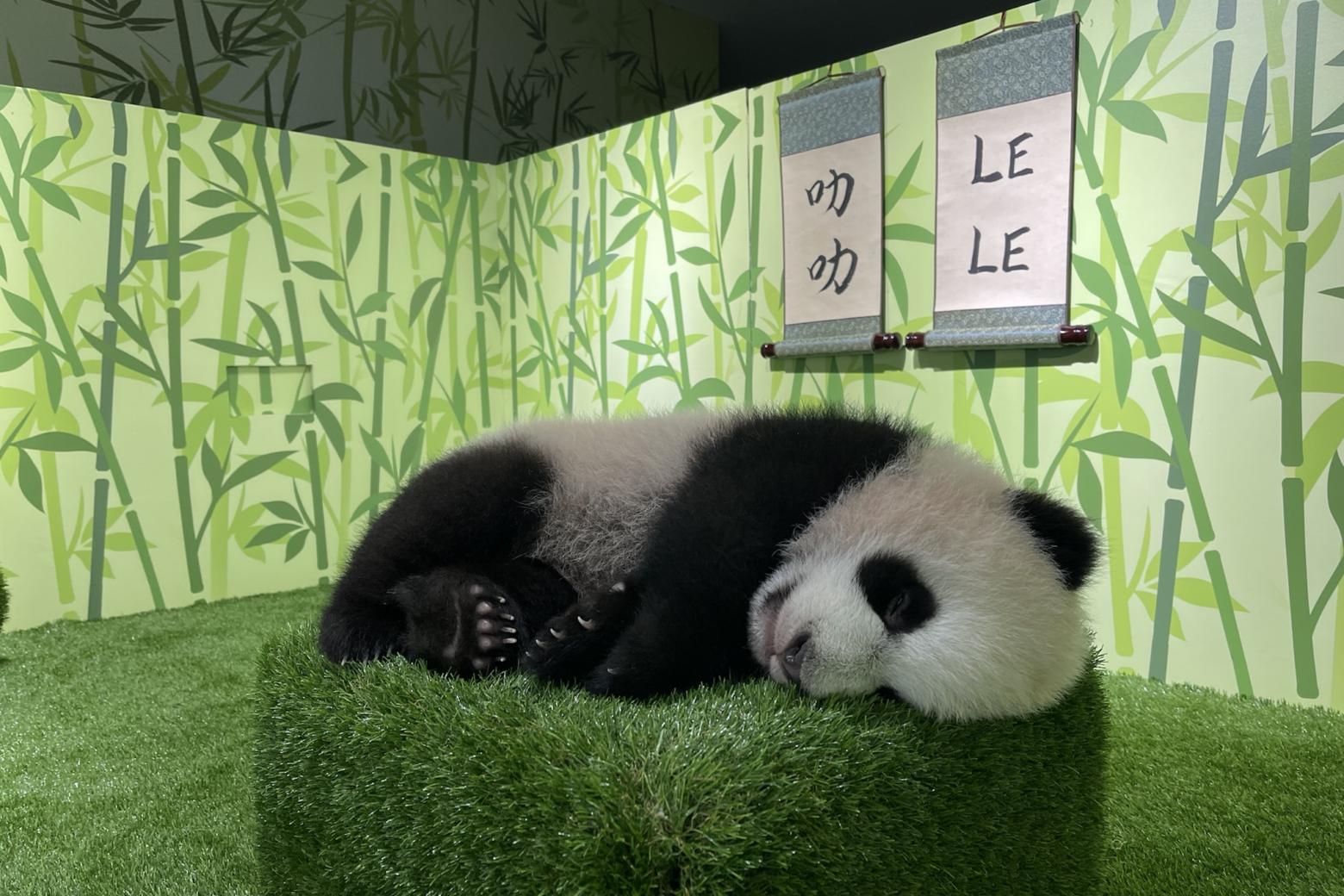Singapore's first panda cub named Le Le; public can see him twice a day from Thursday
Sign up now: Get ST's newsletters delivered to your inbox

The name of the male cub comes from an old Chinese term "shi le po", which refers to Singapore.
PHOTO: MANDAI WILDLIFE GROUP
SINGAPORE - Say hello to baby Le Le - the first panda cub born in the Republic - which will be receiving visitors at River Wonders from Thursday (Dec 30).
Viewing times at his new glass-fronted nursery at the Giant Panda Forest are scheduled for around 10.30am and 3.30pm daily for about 20 to 30 minutes, in line with his and his mother’s present routines, said Mandai Wildlife Group.
The male cub’s name, which comes from an old Chinese term "shi le po", referring to Singapore, was jointly announced on Wednesday (Dec 29) by Singapore and China.
Viewing times at his new glass-fronted nursery at the Giant Panda Forest are scheduled for around 10.30am and 3.30pm daily for about 20 to 30 minutes, in line with his and his mother’s present routines, said Mandai Wildlife Group.
The male cub’s name, which comes from an old Chinese term "shi le po", referring to Singapore, was jointly announced on Wednesday (Dec 29) by Singapore and China.
Singapore's Deputy Prime Minister Heng Swee Keat and Chinese Vice-Premier Han Zheng revealed the name at a virtual ceremony.
Both ministers are co-chairs of the 17th Joint Council for Bilateral Cooperation and related Joint Steering Council meetings, held virtually on Wednesday.
The term "shi le po" was in use back when Singapore was starting out as a trading port. It is also a transliteration of the Malay term “selat”, which means straits, and is indicative of Singapore’s geographical location.
In a Facebook post on Wednesday, Prime Minister Lee Hsien Loong said the panda cub "surely symbolises the harmonious relationship between our panda couple, and our bilateral ties with China".
Le Le was born to giant pandas Kai Kai and Jia Jia on Aug 14 - their firstborn since they arrived in Singapore in 2012 on loan from Chengdu, China, as sub-adults.
Coming in at an estimated 200g at birth, he weighed 9.62kg on Wednesday.
The cub has been a fan favourite since his adorable pictures made the rounds on social media.
Visitors to River Wonders, formerly known as River Safari, can catch Le Le playing with specially created enrichment toys, learning to walk more confidently or catching up on sleep time.
Mandai Wildlife Group animal care officer Trisha Tay Ting Ni said the nursery was constructed to provide a fun and safe space for Le Le to meet guests for part of his day before returning to his mother’s side.
“At four-and-a-half months, he continues to be heavily reliant on mom’s milk and tender loving care. Both Le Le and Jia Jia are also still getting used to spending more time away from each other, so we adapt their daily routines based on close observation to ensure their well-being remains the top priority and that they do not display any stressful behaviours,” she said.
Visitors to River Wonders, formerly known as River Safari, can catch Le Le playing with specially created enrichment toys, learning to walk more confidently or catching up on sleep time.
Mandai Wildlife Group animal care officer Trisha Tay Ting Ni said the nursery was constructed to provide a fun and safe space for Le Le to meet guests for part of his day before returning to his mother’s side.
“At four-and-a-half months, he continues to be heavily reliant on mom’s milk and tender loving care. Both Le Le and Jia Jia are also still getting used to spending more time away from each other, so we adapt their daily routines based on close observation to ensure their well-being remains the top priority and that they do not display any stressful behaviours,” she said.
Earlier this year, names for the cub were submitted by members of the public, and reviewed by a judging panel made up of academics and representatives from the Chinese Embassy in Singapore, relevant government agencies and Mandai Wildlife Group.
More than 64,000 votes were cast for a shortlisted five names between Nov 3 and 7, and more than 31,000 of them were in favour of Le Le.
The other names that had been in the running were Hong Hong, Xin Le, Xin Yang and Xin Yuan.
Fourteen-year-old Kai Kai and 13-year-old Jia Jia had displayed signs of being in heat in April, but natural mating was unsuccessful.
Artificial insemination with Kai Kai's frozen sperm was done before the end of Jia Jia's receptive period, to make the most of the once-a-year breeding season.
When Le Le turns two, he will have to return to China under the terms of the original panda loan agreement with the China Wildlife Conservation Association.
The successful birth comes after the giant pandas' seventh breeding season. They began mating in 2015.


